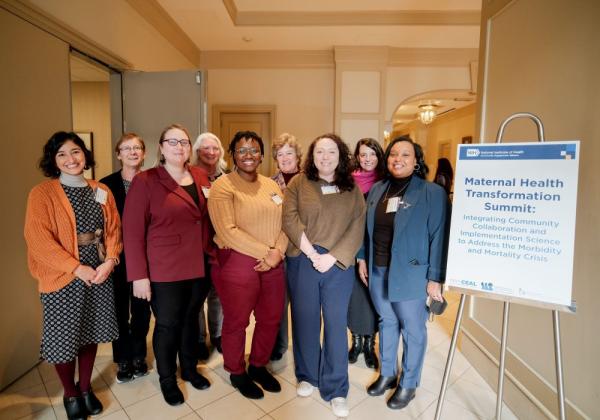Uniting Research and Community: Insights From the Maternal Health Transformation Summit
Earlier this year, the Community Engagement Technical Assistance Center (CETAC) hosted the first Maternal Health Transformation Summit. The Summit brings together researchers, policy experts, supporters, public health professionals, and community leaders from the Maternal Health Community Implementation Program (MH-CIP) and the Implementing a Maternal health and PRegnancy Outcomes Vision for Everyone Community Implementation Program (IMPROVE-CIP). MH-CIP and IMPROVE-CIP are part of the National Institutes of Health Community Engagement Alliance (CEAL). Attendees, sharing a commitment to improving maternal health outcomes in the U.S., participated in rich discussions, workshops, and well-attended meetings throughout the Summit.
Digging into the latest data and research, Dr. Juanita Chinn of the NICHD–IMPROVE Task Force stressed the urgent need to prevent birthing women from dying or experiencing severe health issues during and after childbirth. More than 50,000 women face serious pregnancy-related health conditions every year. In 2021, over 1,200 maternal deaths* were recorded.
Dr. Shannon Maloney, with the University of Nebraska Medical Center, an IMPROVE-CIP research team, explored Indigenous communities’ history and current challenges. Focusing on Indigenous individuals' lived experiences, the session showed the connections among history, policy, and maternal health outcomes while paving a path toward responsive and community-driven solutions.
Denys Symonette Mitchell of Tulane University, an MH-CIP research team, led a thought-provoking session that looked at the underrepresentation of Black women in the perinatal workforce and the reasons for differences in breastfeeding behaviors. She offered insights into how federal policy and research can support meaningful change.
Themes of community engagement and working together were repeated throughout the Summit, highlighting the need for community-involved approaches that include everyone in addressing maternal health. From sessions on respectful care to workshops on the science of beginning and evaluating programs, participants engaged in meaningful discussions, sharing best practices, insights, and lessons learned.
The Maternal Health Transformation Summit set the stage for continued cooperation between researchers and communities to work towards a future where every woman receives the support and care needed for safe pregnancies.

Last updated: March 13, 2025